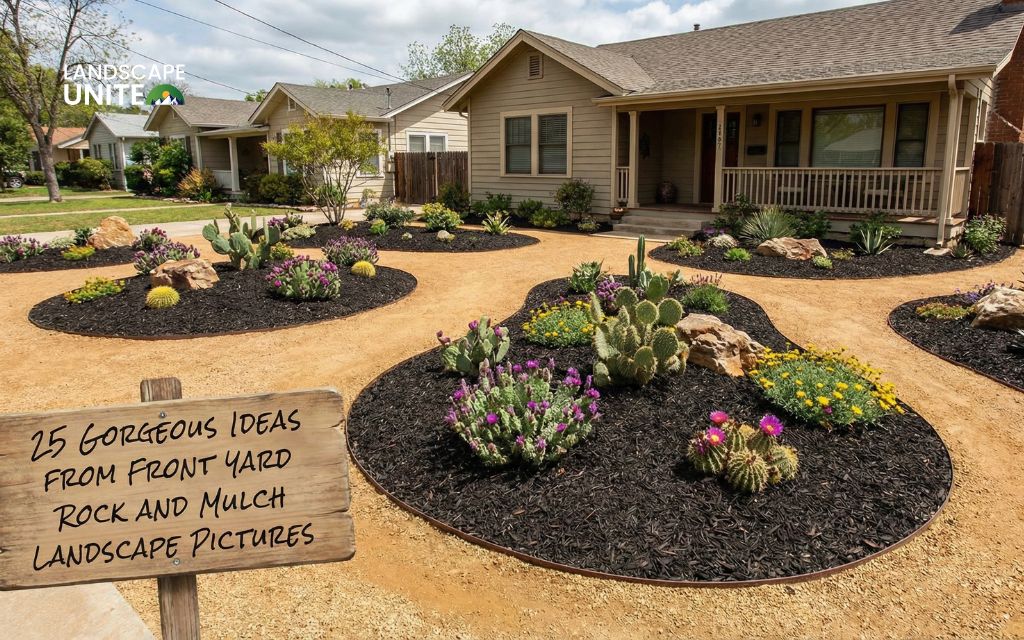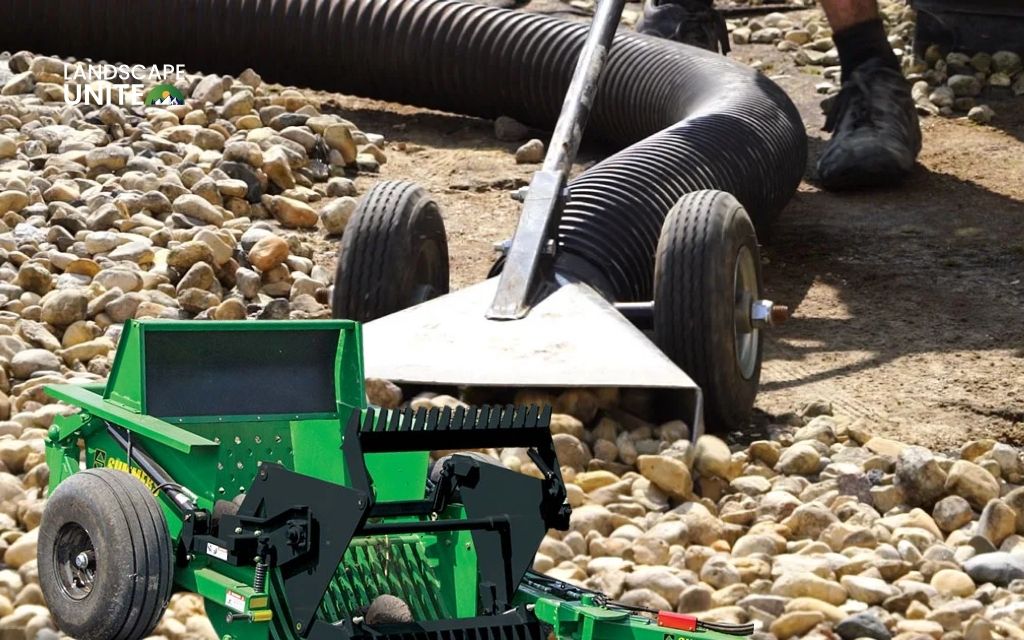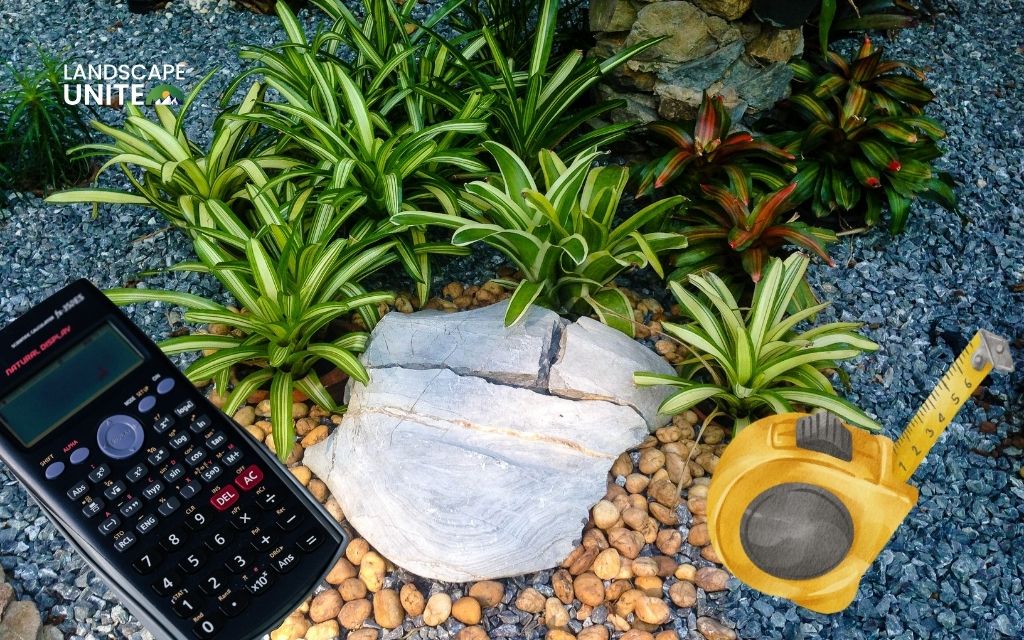Colorado’s semi-arid climate brings unique challenges for homeowners. With over 300 days of sunshine annually and dramatic temperature swings, choosing the right landscaping rock types isn’t just about looks. It’s about creating sustainable, water-wise outdoor spaces that actually work in our challenging environment.
Are you wondering which types of landscape rocks will thrive in Colorado’s freeze-thaw cycles? Whether you’re new to xeriscaping or a longtime Denver resident seeking low-maintenance solutions, understanding different types of landscaping rocks suited for our climate is essential.
This guide explores the top landscaping rock types specifically tested for Colorado conditions, covering their unique properties, best applications, and local availability.
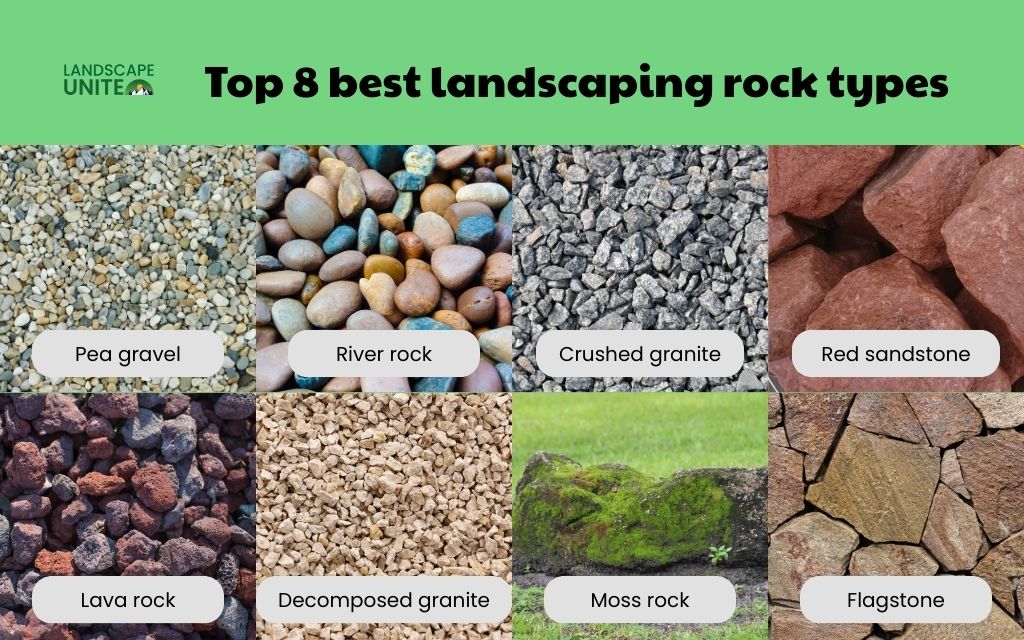
Top 8 Colorado-tested landscaping rock types
1. Pea gravel: The versatile xeriscaping champion
Small, rounded stones measuring 3/8 inch create one of the most adaptable types of rocks for landscaping. These earth-toned gems excel in walkways, drainage areas, and xeriscaping mulch applications.
Colorado advantage: Excellent weed suppression in dry climates makes pea gravel ideal for water-wise gardening. The small size allows for easy installation and natural settling.
Best applications: Walkways, drainage solutions, xeriscaping mulch, and accent borders around native Colorado plants.
Get 10 creative landscaping ideas with rocks and mulch in this blog.
2. River rock: Premium drainage and aesthetics
These smooth, oval stones range from 1 to 3 inches and represent some of the most reliable types of river rocks for landscaping. Their natural tumbling creates beautiful, weathered surfaces perfect for Colorado’s natural aesthetic.
Colorado advantage: Superior freeze-thaw resistance makes river rock types of landscape rock particularly valuable for managing Denver’s seasonal water runoff and slope stabilization.
Best applications: Dry creek beds, decorative borders, erosion control, and creating natural-looking water features.
3. Crushed granite: The durable pathway solution
Angular, compactable stone fragments create stable surfaces that perform exceptionally well in high-altitude conditions. This type of landscape rock provides excellent foundation support for various applications.
Colorado advantage: Compacts beautifully in high-altitude conditions, creating long-lasting pathways and driveways that withstand Colorado’s extreme weather.
Best applications: Stable walkways, driveways, xeriscaping base layers, and foundation material for native plantings.
4. Colorado red sandstone: Native beauty and durability
This quartzitic sandstone features distinctive red coloring from iron oxide deposits specific to regional geology. As one of the most authentic different types of landscape rock available locally, it creates stunning focal points.
Colorado advantage: Locally quarried from the Front Range and Rocky Mountains, this native stone naturally adapts to Colorado’s climate while providing authentic Rocky Mountain aesthetics.
Best applications: Accent features, retaining walls, decorative elements, and creating authentic Colorado landscape designs.
5. Lava rock: Lightweight insulation champion
Porous volcanic stone available in red and black varieties offers unique benefits among different types of rocks for landscaping. The lightweight nature combined with excellent insulation properties makes it perfect for xeriscaping applications.
Colorado advantage: Superior insulation properties protect plants from Colorado’s intense UV exposure and dramatic temperature swings at high altitudes.
Best applications: Mulch alternative, fire-resistant zones, xeriscaping, and plant protection in extreme weather conditions.
Thinking about adding lava rocks to your garden? Explore these 7 creative lava rock landscaping ideas in our guide.
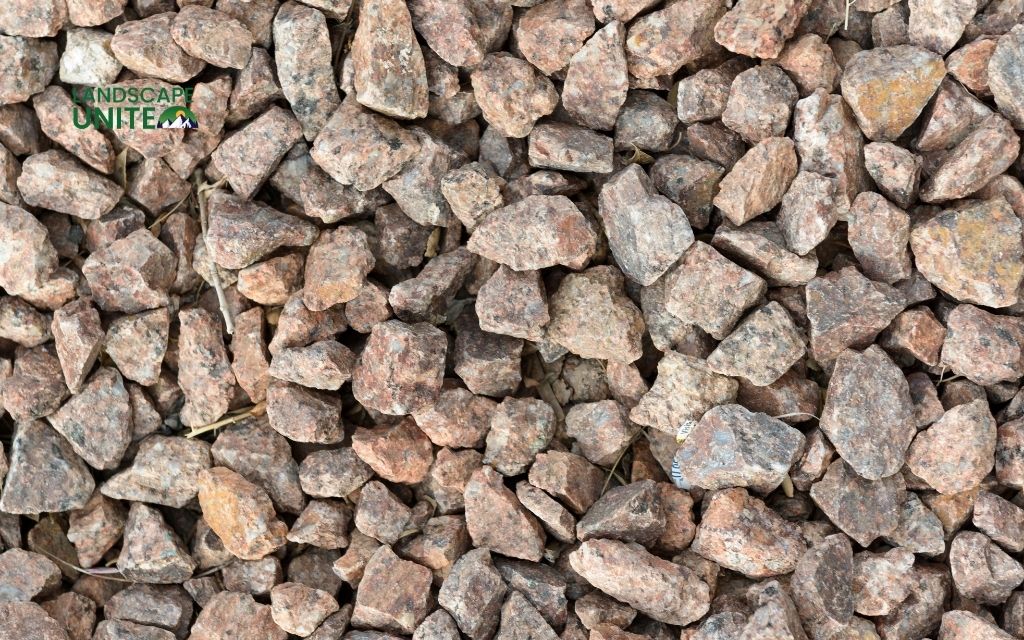
6. Decomposed granite: The natural pathway surface
Finely crushed granite compacts smoothly to create natural-looking surfaces that blend seamlessly with Colorado’s landscape. This type of rocks for landscaping offers versatility for various design applications.
Colorado advantage: Blends naturally with Colorado’s existing landscape while providing stable, permeable surfaces for pathways and patio alternatives.
Best applications: Zen gardens, natural pathways, patio alternatives, and creating smooth transitions between landscape elements.
7. Denver moss rock: Local specialty stone
Granite boulders with natural lichen coverage represent a unique type of landscape rock specifically adapted to Colorado’s climate. These stunning specimens feature naturally occurring moss and lichen growth that thrives in our environment.
Colorado advantage: Naturally adapted to Colorado’s climate, these boulders create authentic Front Range mountain aesthetics while providing erosion control and focal points.
Best applications: Focal points, terraced gardens, erosion control, and creating natural-looking boulder fields.
8. Flagstone: Premium hardscaping material
Flat sedimentary slabs create solid surfaces perfect for formal hardscaping applications. Available in Colorado buff and red varieties, flagstone represents premium types of rocks for sophisticated designs.
Colorado advantage: Available in local Colorado buff and red varieties, flagstone provides durable surfaces that complement regional architecture and natural surroundings.
Best applications: Patios, stepping stones, formal areas, and creating elegant outdoor living spaces.
Why rock type selection matters in Colorado’s climate
Understanding Denver’s freeze-thaw cycles
Colorado’s extreme temperature fluctuations create unique challenges for landscape materials. Different landscape rock types respond differently to these cycles, making proper selection crucial for long-term success.
The freeze-thaw process can crack or damage inappropriate materials, leading to costly replacements. Rock types for landscaping must possess sufficient density and structure to withstand repeated freezing and thawing.
High-altitude UV exposure and rock durability
Colorado’s high altitude increases UV exposure significantly. Some types of river rock for landscaping fade or degrade under intense mountain sun, while others maintain their color and integrity.
Native Colorado materials like red sandstone and moss rock naturally adapt to these conditions, having formed under similar environmental pressures over millions of years.
Water conservation benefits in semi-arid conditions
Proper rock selection supports xeriscaping principles essential for Colorado’s water-wise landscaping. Different types of landscaping rock provide varying levels of water retention, drainage, and evaporation control.
Strategic placement of appropriate rock types creates microclimates that support native plants while minimizing water needs.
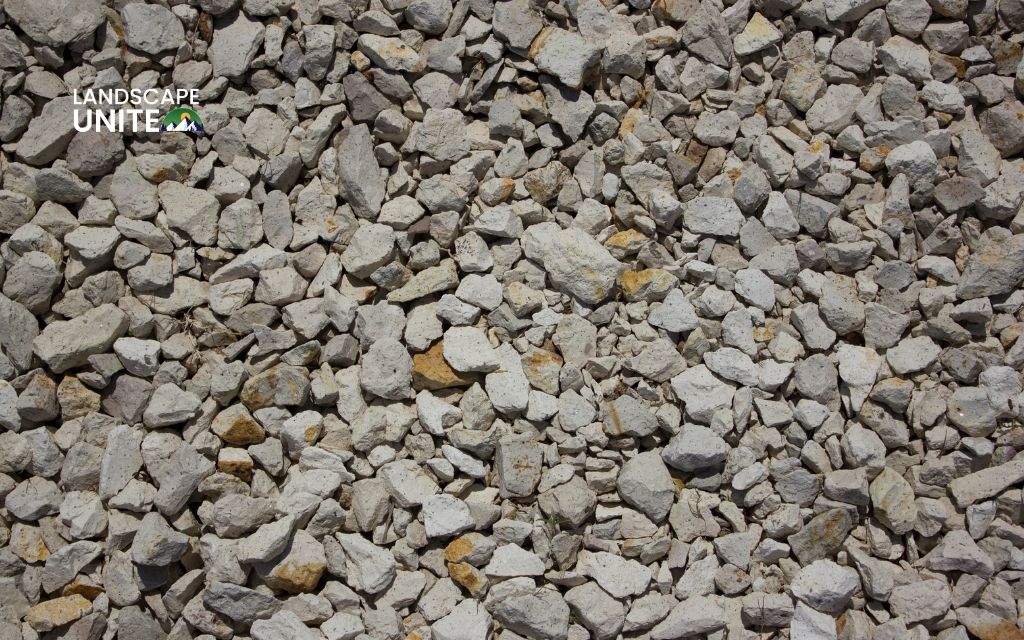
Strategic rock selection for Colorado applications
Xeriscaping and water conservation
The best landscaping rocks types for xeriscaping include pea gravel, decomposed granite, and native Colorado stones. These materials work together to create water-efficient landscapes that thrive in our semi-arid climate.
Combining different types of landscaping rocks allows you to create varied textures and microclimates within the same design. For example, larger river rock types create drainage areas while smaller pea gravel provides plant mulch.
Seasonal weather considerations
Colorado’s seasonal changes demand careful consideration of rock selection. Types of river rocks for landscaping must handle snow removal equipment, ice formation, and rapid temperature changes without cracking or shifting.
Wind resistance becomes particularly important at high altitudes, where strong chinook winds can move lighter materials. Proper rock selection and installation techniques prevent displacement during Colorado’s notorious windstorms.
Functional applications guide
- Drainage solutions: River rock and pea gravel excel in managing Colorado’s seasonal water runoff and preventing erosion during intense summer storms.
- Pathways: Crushed granite and decomposed granite create stable, permeable surfaces that handle foot traffic while allowing water infiltration.
- Decorative features: Colorado red sandstone and moss rock provide authentic regional character while withstanding extreme weather conditions.
- Erosion control: Larger boulders and cobblestone effectively prevent soil erosion on slopes common in Colorado’s terrain.
Planning to add rocks to your yard? Gain useful insights on how to install landscape rocks with this best guide.
Common mistakes to avoid in Colorado rock landscaping
Ignoring drainage requirements
Colorado’s intense summer storms require proper drainage planning. Many homeowners underestimate the importance of selecting appropriate types of landscape rocks for drainage applications.
Poor drainage selection leads to water pooling, erosion, and potential foundation damage during heavy rainfall or snowmelt.
Choosing inappropriate rock sizes
Size selection significantly impacts functionality and aesthetics. Different types of rocks for landscaping serve specific purposes, and mixing sizes inappropriately can create maintenance issues and visual problems.
Neglecting seasonal maintenance needs
Even the best rock types for landscaping require seasonal attention in Colorado’s climate. Proper maintenance ensures longevity and continued performance through extreme weather conditions.
Maintaining rocks in your garden is an essential task. Learn the proper way to clean garden rocks in the following guide.
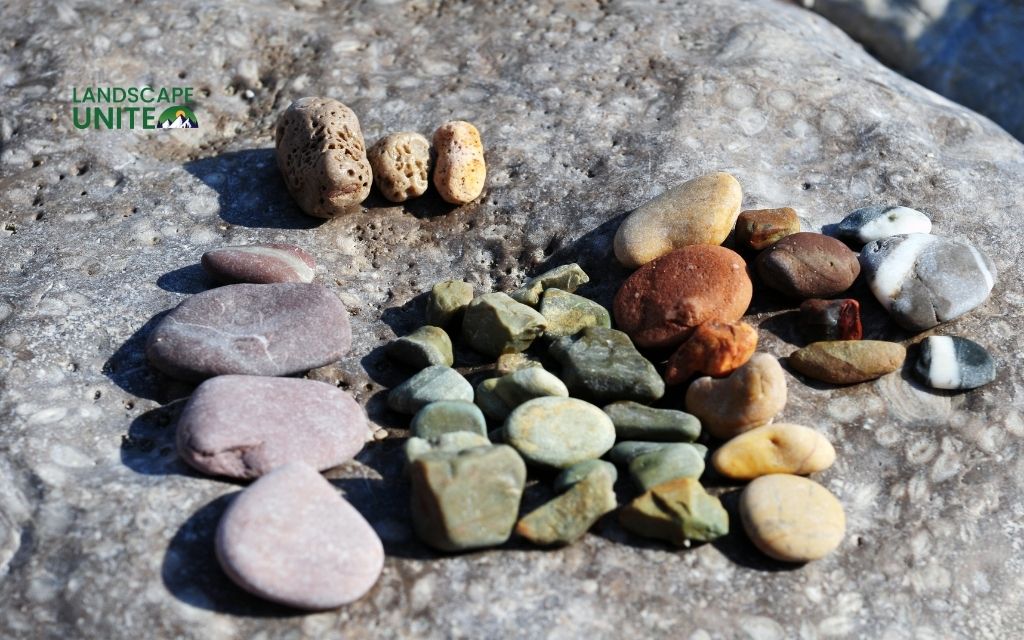
Professional installation tips for Colorado
Base preparation for high-altitude conditions
Proper excavation depths and base preparation become crucial at high altitudes where freeze-thaw cycles can shift improperly installed materials.
Drainage considerations must account for Colorado’s unique combination of intense precipitation events and rapid evaporation rates.
Maintenance requirements by rock type
Different landscape rock types require specific maintenance approaches. Understanding these requirements helps ensure long-term success and beauty in Colorado’s challenging environment.
- Weed control strategies: Proper selection and installation of landscaping rocks types significantly reduces weed growth, but some maintenance remains necessary
- Seasonal adjustments: Colorado’s extreme weather may require periodic adjustments to rock placement and drainage systems
Cost analysis and local sourcing
Understanding Colorado pricing factors
Local availability significantly impacts costs for different types of landscaping rocks. Colorado red sandstone and moss rock command premium prices due to their unique regional character and limited availability.
Transportation costs from quarries affect pricing, making locally sourced materials more economical for large projects.
Design ideas: Combining rock types for maximum impact
Successful Colorado landscapes often combine multiple types of river rocks for landscaping with complementary materials. Popular combinations include pea gravel with boulder accents or river rock with flagstone pathways.
Creating visual interest through texture and color variations while maintaining climate appropriateness requires careful planning and professional expertise.
Conclusion
Selecting the right landscaping rock types for Colorado’s climate involves balancing functionality, aesthetics, and local climate considerations. By choosing appropriate materials like native Colorado sandstone, durable river rock, or versatile pea gravel, you’ll create landscapes that thrive in our unique high-altitude environment.
Remember to source materials from reputable Colorado suppliers and consider professional installation for complex projects. Proper selection and installation of different types of landscaping rocks creates beautiful, sustainable outdoor spaces that enhance your property while conserving water and reducing maintenance.
Ready to transform your Colorado landscape with the perfect rock selection? Follow Landscape Unite today for expert consultation and professional installation services throughout Colorado and Denver areas. Our experienced team understands Colorado’s unique climate challenges and can help you create the perfect outdoor space for your home.
Unsure how to design your garden with rocks? Here are some suggestions you’ll love.
- 14 rock and turf landscaping ideas that make your front yard look amazing
- 20+ rock landscaping ideas that’ll make your lawn both gorgeous and water-wise
- 16+ front yard rock designs guaranteed to wow your neighbors
- 18+ backyard rock landscaping ideas that turn your garden into an oasis
- 21 poolside rock landscaping ideas that totally transform your backyard
Frequently asked questions (FAQs)
What’s the most cost-effective landscaping rock for large Denver yards?
Pea gravel offers excellent value while providing superior xeriscaping benefits and easy installation.
Which rock types work best for Colorado’s freeze-thaw cycles?
River rock, crushed granite, and native Colorado sandstone offer superior freeze-thaw resistance due to their density and structure. Revive Health Recovery can help you select the best options for your specific location.
Can I mix different rock types in one Colorado landscape?
Yes, combining textures and sizes creates visual interest and functional benefits. Popular combinations include pea gravel with boulder accents or river rock with flagstone pathways.
